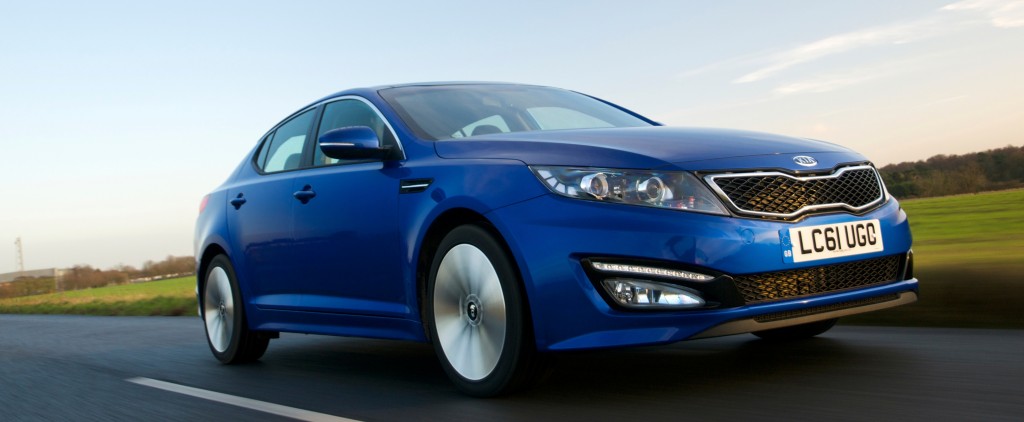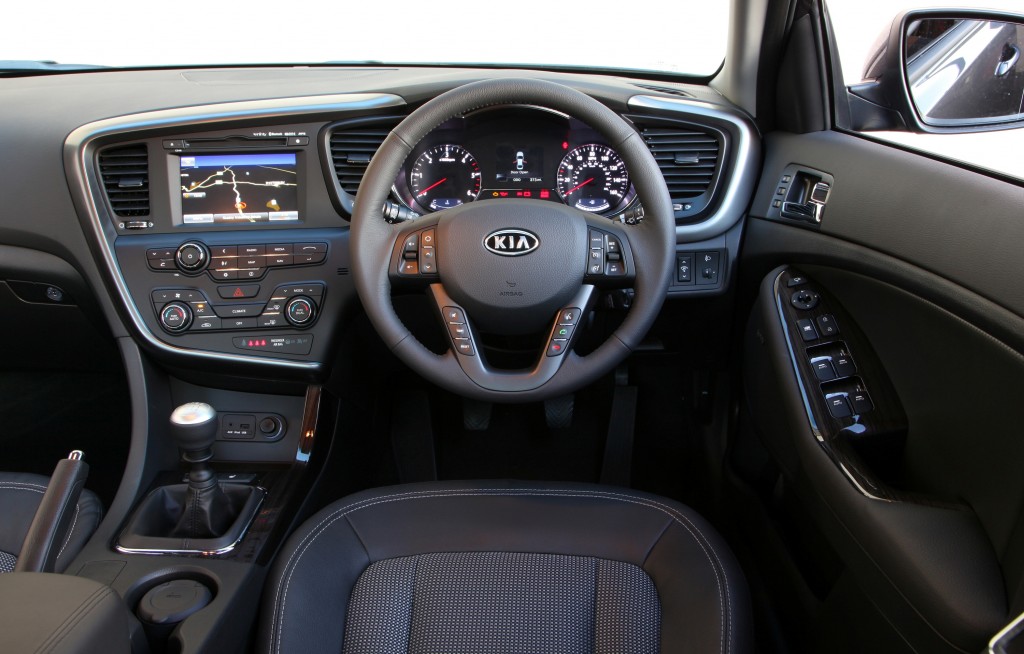Kia Optima 1.7 CRDi ‘3’
THE OPTIMA is the all-new flagship saloon that is the latest model to be launched in Kia’s design-led product offensive. It went on sale in the UK in February, bringing fantastic design, high levels of standard specification and low running costs.
The Kia Optima is a credible car for business. It looks sharp and handles any commute admirably. The steering lacks feel, so you don’t get much sense of connection with the road surface, but the car is comfortable, has enough power, and is easy to live with.
It is sold only with a diesel engine – a new 134 bhp version of Kia’s smooth and efficient 1.7-litre CRDi ‘U2’ power unit – but the Optima contains every essential for the corporate user. Features include a high-end Infinity audio system, self-parking, heated and cool-ventilated seats, cornering lights, panoramic sunroof, reverse parking camera and an automatic cabin defogging system.
The interior is sporty, and the fascia tilts towards you so that all the major controls are within your sight-line for best visibility and ease of use. Slim armrests in the doors have integral audio speakers, freeing up more storage space in the panel beneath. And in the top-of-the-range Optima 3, on test here, mood lighting in the lower part of the doors and the centre fascia adds to the cabin’s already sophisticated ambience.
The Optima is based on an all-new platform which ensures it has class-leading passenger space, while being no larger than its competitors. The boot is decently roomy, and there is a lower lip to make loading the car less strenuous. The 60:40 split folding rear seats also allow longer loads to be transported.
It is a safe motor too. All versions have Electronic Stability Control (ESC) to counter any tendency of the car to skid out of control because of bad weather or over-exuberant driving. This is linked to Vehicle Stability Management (VSM), which senses when the wheels on one side of the car are on a lower-grip surface than those on the other side. VSM then stabilises the car by reducing the amount of steering assistance if you are applying too much steering effort, or increasing it you are applying too little.
To alert other motorists to sudden braking, an Emergency Stop Signalling system (ESS) is also fitted. This flashes the brake lights rapidly to warn following drivers. In addition, the Optima is fitted with front, side and curtain airbags, plus active front-seat head restraints to minimise the risk of whiplash injuries.
The manual version of the Optima features Kia’s EcoDynamics fuel-saving, CO2-reducing measures, including Intelligent Stop & Go and aerodynamic drag-reducing measures. The diesel engine develops similar power and torque to the 2.0-litre units in European and Japanese rivals, but from a smaller capacity. Acceleration from 0-60 mph takes 10.2 seconds, and the car can reach a top speed of 125 mph. Better still, the Optima can achieve 57.6 miles per gallon, and it only pumps out CO2 emissions of 128 g/km.
The Optima’s ride provides the perfect combination of stability with refinement on the long motorway drives that are a fact of life for many business drivers. Extensive noise-reduction measures ensure minimal transmission of engine and road sound, while the low co-efficient of drag not only helps fuel economy but also minimises wind turbulence.
As with all Kias, the Optima comes with the South Korean company’s unique seven-year or 100,000-mile warranty, which is fully transferable to subsequent owners.
PROS ‘N’ CONS
- Looks √
- Comfort √
- Room √
- Efficiency √
- Steering lacks feel X
FAST FACTS
- Max speed: 125 mph
- 0-60 mph: 10.2 secs
- Combined mpg: 57.6
- Engine: 1685 cc 4 cylinder turbo diesel
- Max. power (bhp): 134 at 4000 rpm
- Max. torque (lb/ft): 325 at 2000-2500 rpm
- CO2: 128 g/km
- Price: £24,495 on the road
Fine City Magazine, June 2012
Strictly Business Magazine, April 2012
-
Categories
- Abarth
- Alfa Romeo
- Aston Martin
- Audi
- Bentley
- BMW
- Caterham
- Chevrolet
- Chrysler
- Citroen
- Dacia
- DS
- Ferrari
- Fiat
- Ford
- Great Wall
- Honda
- Hyundai
- Infiniti
- Isuzu
- Jaguar
- Jeep
- Kia
- Land Rover
- Lexus
- Lotus
- Maserati
- Mazda
- McLaren
- Mercedes
- MG
- Mini
- Miscellaneous Articles
- Mitsubishi
- Morgan
- Motability
- Nissan
- Peugeot
- Porsche
- Renault
- Rolls-Royce
- Saab
- Seat
- Skoda
- Subaru
- Suzuki
- Tesla
- Toyota
- Vauxhall
- Volvo
- VW
- Zenos
-
Articles
- June 2025
- April 2025
- February 2025
- January 2025
- September 2024
- July 2024
- March 2024
- January 2024
- December 2023
- September 2023
- August 2023
- May 2023
- January 2023
- October 2022
- July 2022
- May 2022
- April 2022
- February 2022
- December 2021
- November 2021
- October 2021
- September 2021
- August 2021
- July 2021
- June 2021
- May 2021
- April 2021
- March 2021
- February 2021
- January 2021
- December 2020
- November 2020
- October 2020
- September 2020
- August 2020
- July 2020
- June 2020
- May 2020
- April 2020
- March 2020
- February 2020
- October 2019
- September 2019
- August 2019
- July 2019
- June 2019
- April 2019
- March 2019
- February 2019
- January 2019
- October 2018
- August 2018
- July 2018
- June 2018
- April 2018
- March 2018
- December 2017
- August 2017
- July 2017
- June 2017
- May 2017
- March 2017
- February 2017
- January 2017
- December 2016
- November 2016
- October 2016
- September 2016
- August 2016
- July 2016
- May 2016
- April 2016
- March 2016
- February 2016
- January 2016
- December 2015
- November 2015
- October 2015
- September 2015
- August 2015
- July 2015
- June 2015
- May 2015
- April 2015
- March 2015
- February 2015
- January 2015
- December 2014
- November 2014
- October 2014
- September 2014
- August 2014
- July 2014
- June 2014
- May 2014
- April 2014
- February 2014
- January 2014
- December 2013
- November 2013
- October 2013
- September 2013
- August 2013
- July 2013
- June 2013
- May 2013
- April 2013
- March 2013
- February 2013
- January 2013
- December 2012
- November 2012
- October 2012
- September 2012
- August 2012
- July 2012
- June 2012
- May 2012
- April 2012
- March 2012
- February 2012
- January 2012
- December 2011
- November 2011
- October 2011
- September 2011
- August 2011
-
Meta





